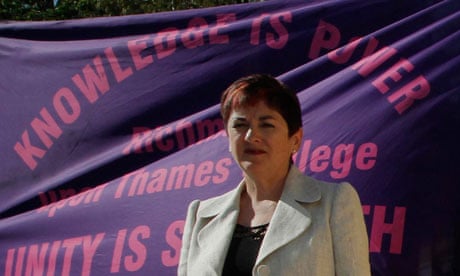England's schools are increasingly divided along class lines, making it harder than ever for the poorest children to succeed, a union leader has warned.
Mary Bousted, general secretary of the Association of Teachers and Lecturers (ATL), said middle-class parents were keeping their children away from the most deprived schools, creating clusters of "schools for the dispossessed".
This was having a toxic effect on the poorest children, who often needed to be with aspirational middle-class peers to flourish academically, Bousted told the ATL's annual conference in Manchester.
"We have schools for the elite, schools for the middle class and schools for the working class," she said. "Too few schools have mixed intakes where children can learn those intangible life skills of aspiration, effort and persistence from one another … the problem in the schools of the dispossessed is that they are peopled by children who lack resilience."
Bousted said that in a "vastly unequal society", only the brightest pupils would escape the lasting effects of inequality.
She blamed the coalition government for the increased social segregation in schools. Ministers were "seeking to wash their hands, like Pontius Pilate, of all the causes of educational failure over which they have more control than anyone else", she said.
"In the world of Michael Gove, the education secretary, and Nick Gibb, the schools minister, it is the school and only the school that holds the responsibility for the educational outcomes of the poor. If the poor don't make as much progress as the rich, it is the school and the teachers … who are to blame … It is a lie which conveniently enables ministers to evade responsibility for the effects of their policies."
Coalition cuts to education were working against teachers, who were "straining every sinew" to combat the effects of poverty among their pupils, she said.
A report last October by the Institute for Fiscal Studies found that the coalition was making the largest cut to education spending since the 1950s. Public spending on UK education would fall by 14.4% between 2010-11 and 2014-15, its researchers said.
Bousted said cutting help for children with special needs, abolishing the education maintenance allowance and ringfencing funds for school meals would result in "destruction that will be with us as a society for generations … This is the coalition government's dirty little secret. This is what they have done, to make the lives of poor children, already disadvantaged and demeaned through their poverty, harder."
The poorest pupils would not be helped by the creation of more grammar school places, she said, because evidence showed they were less likely than their better-off peers to go to such schools.
Last month the Conservative-controlled Kent county council voted to allow the creation of two satellite grammar schools linked to existing schools in the county. It is the first expansion of a grammar school in more than half a century.
The decision in Kent was in response to a petition signed by more than 2,000 parents calling for grammar school places to be created in Sevenoaks. Currently, more than 1,000 children commute from the area to grammar schools in neighbouring towns.
Bousted said she had misgivings about Labour's academy programme but the party had built new schools in the poorest areas and these had had a socially mixed intake.

Comments (…)
Sign in or create your Guardian account to join the discussion